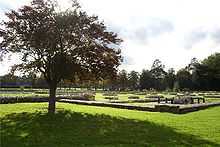Henry Knighton

Henry Knighton (or Knyghton) (died c. 1396, in England) was an Augustinian canon at the abbey of St Mary of the Meadows, Leicester, England, and an ecclesiastical historian (chronicler).[1] The abbey he was in charge of was associated with the House of Lancaster.[2]
Biography
Biographical information on Knighton mainly comes from his chronicle, in the first three books of which his name is shown as HENRICVS CNITTON.[3] Knighton was a canon at the "St Mary of the Meadows" abbey before 1363, since he was recorded as being present during a visit from King Edward III.[3] He was at the abbey for some 33 years and took great interest in the abbey being a prosperous interest.[4] The Augustinian abbey where Knighton lived was one of the wealthiest in England. Knighton was a canon of this abbey just south of Leicester in the 1360s and the abbey's manor was named "Knighton." He probably acquired his original "Knighton" name from this manor.[3]
Knighton was a supporter of King Edward III and wrote well of him,[5] although historian Louisa D. Duls labels Knighton as a member of the "Lancastrian Detractors of Richard" school.[6] Knighton calls five of King Richard II's trusted advisors – Robert de Vere, Alexander Neville, (Archbishop of York), Sir Michael de la Pole, 1st Earl of Suffolk (lord chancellor), Sir Robert Tresilian (chief justice of the King's Bench), and Sir Nicholas Brembre – the five evil seducers of the king ("quinque nephandi seductores regis").[7]
Knighton lived during the same time period as John Wycliffe and had personal knowledge of him as he went to Oxford when Wycliffe was a master there. However he was neither directly associated with Wycliffe nor with the Lollards ("Wycliffities", followers of Wycliffe's philosophies). Knighton was the first historian of Lollardy.[8] He writes that those voicing Church complaints and echoing the principles of Wycliffe in 1382, hence being associated with the principles of the Lollards, were every second man in the Kingdom of England.[9]
Knighton did not care for Wycliffe's church reform doctrines or the Lollards as both threatened his way of life.[10] He respected Wycliffe although as an academic scholar, writing he was a famous and very important ecclesiastic clergyman and philosopher of the time.[11]
See also
Notes
- ↑ Vaughan, p. 246 footnote 24
- ↑ THE MIND'S EYE thesis (p. 1-140) by Sara Keehan
- ↑ 3.0 3.1 3.2 Martin, p. xvii
- ↑ THE MIND'S EYE thesis (p. 33) by Sara Keehan
- ↑ Drees, p. 271
- ↑ Duls, pp. 212-214, 250
- ↑ Martin, p. 392
- ↑ Martin, p. xviii
- ↑ Vaughan, p. 150
- ↑ THE MIND'S EYE thesis (p. 44-47) by Sara Keehan
- ↑ Deanesly, p. 239
Sources
- Martin, Geoffrey Haward (translator); Knighton's Chronicle 1337-1396; Clarendon Press, 1995, ISBN 0198205031
- Duls, Louisa DeSaussure, Richard II in the Early Chronicles, Paris: Mouton, 1975
- Deanesly, Margaret, The Lollard Bible and other Medieval Biblical Versions, Cambridge University Press, 1920
- Vaughan, Robert, The life and opinions of John de Wycliffe, Holdsworth and Ball, 1831, 2nd ed. Internet archive